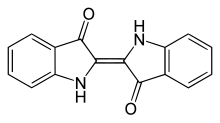The Baeyer–Drewson indigo synthesis (1882) is an organic reaction in which indigo is prepared from 2-nitrobenzaldehyde and acetone

The reaction is classified as an aldol condensation. As a practical route to indigo, this method was displaced by routes from aniline.
 Johann Friedrich Wilhelm Adolf von Baeyer (German: [ˈbaɪɐ]; October 31, 1835 – August 20, 1917) was a German chemist who synthesized indigo, and was the 1905 recipient of the Nobel Prize in Chemistry.
Johann Friedrich Wilhelm Adolf von Baeyer (German: [ˈbaɪɐ]; October 31, 1835 – August 20, 1917) was a German chemist who synthesized indigo, and was the 1905 recipient of the Nobel Prize in Chemistry.
 Indigo dye is an organic compoundwith a distinctive blue color (see indigo). Historically, indigo was a natural dyeextracted from plants, and this process was important economically because blue dyes were once rare. A large percentage of indigo dyeproduced today – several thousand tons each year – issynthetic. It is the blue often associated with blue jeans.
Indigo dye is an organic compoundwith a distinctive blue color (see indigo). Historically, indigo was a natural dyeextracted from plants, and this process was important economically because blue dyes were once rare. A large percentage of indigo dyeproduced today – several thousand tons each year – issynthetic. It is the blue often associated with blue jeans.

The reaction is classified as an aldol condensation. As a practical route to indigo, this method was displaced by routes from aniline.


Indigo and some of its derivatives are known to be ambipolar organic semiconductors when deposited as thin films by vacuum evaporation.

I was diagnosed as HEPATITIS B carrier in 2013 with fibrosis of the
ReplyDeleteliver already present. I started on antiviral medications which
reduced the viral load initially. After a couple of years the virus
became resistant. I started on HEPATITIS B Herbal treatment from
ULTIMATE LIFE CLINIC (www.ultimatelifeclinic.com) in March, 2020. Their
treatment totally reversed the virus. I did another blood test after
the 6 months long treatment and tested negative to the virus. Amazing
treatment! This treatment is a breakthrough for all HBV carriers.